Is Dread Becoming a Scamming Shithole? Who’s Profiting from It?
#Darknet, #Cybercrime, #Privacy, #Tor Network, #crypto #Op-ed
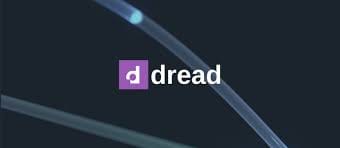
What’s Happening to Dread?
The Darknet’s Forum at a Crossroads
Dread, often referred to as the "Reddit of the Darknet," is a popular and influential forum in the darknet community. It was once a reliable source for discussing darknet markets, privacy, and security. Users could share information, review vendors, and report scams, all while maintaining anonymity. With robust privacy protections, Dread became one of the most trusted platforms for real-time updates on darknet markets. But what was once an esteemed forum seems to be devolving into a breeding ground for scams. Let’s dive in.
The Superlist Scam
First, we have the Superlist, which is now the biggest running scam in Dread’s history. This is hands down the largest scam in all of the darknet. The origins of the Superlist go way back to the Reddit days of /r/darknetmarket. Back then, markets could list themselves freely, and it was up to the community to decide where to shop. It had its pros and cons. Markets that had what it took survived, while others fell behind. A major drawback of the system was that everything was listed alphabetically, which led to a wave of markets with names starting with “A”—Agora, Acropolis, Aero, Alphabay, and so on. It wasn’t perfect, but the community determined the success of a market, not just a handful of people.
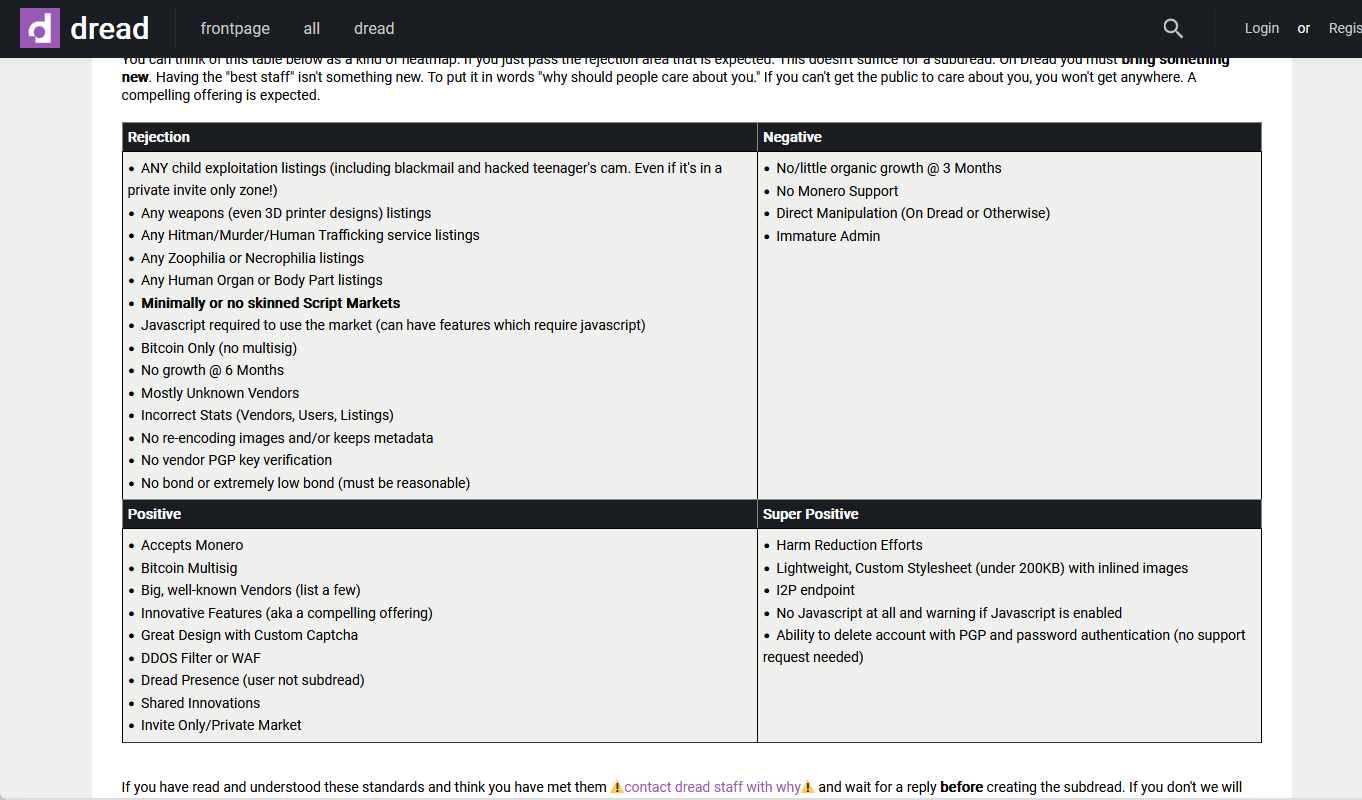
Now, let’s get to the current version of the Superlist. This new version was supposed to weed out bad markets from good ones, supposedly "for the good of the people." The goal was to filter out shady markets and prevent exit scams, ensuring users got the best experience possible. But the effort of maintaining the Superlist seems to fall on just three individuals: Hugbunter (the owner of Dread), Paris (also an admin), and SamWhiskey (a top mod of the popular /d/darknetmarkets sub). Ask any of the three, and you’ll get different answers. Paris will claim Sam picks the markets, Hugbunter says he doesn’t know who does what, but insists markets can’t be listed on Daunt (Dread’s market index) without being on the Superlist first. Meanwhile, Sam just deflects and avoids giving a straight answer. The whole system is a mess, with zero transparency.
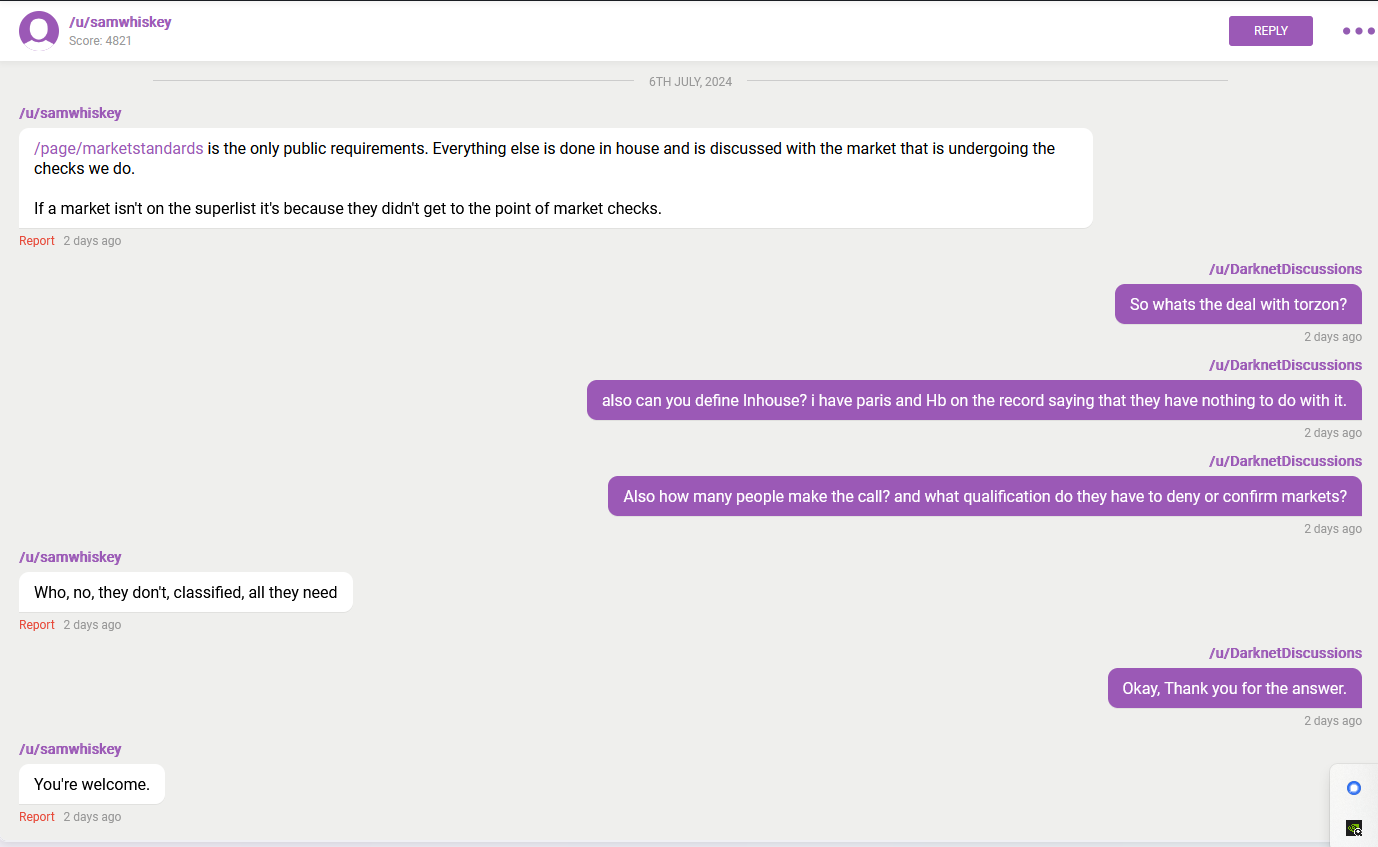
So, let's look at how this Superlist actually works. It was supposed to prevent exit scams and protect users' money. But since the list was created, almost every market listed on it has either stolen users' funds, been involved in some form of extortion, or allowed previously exit-scammed markets to return. And if that wasn’t bad enough, they even tried to introduce new terms like "ungraceful exit" or "dishonorable exit" to soften the blow when a market pulls off a scam.
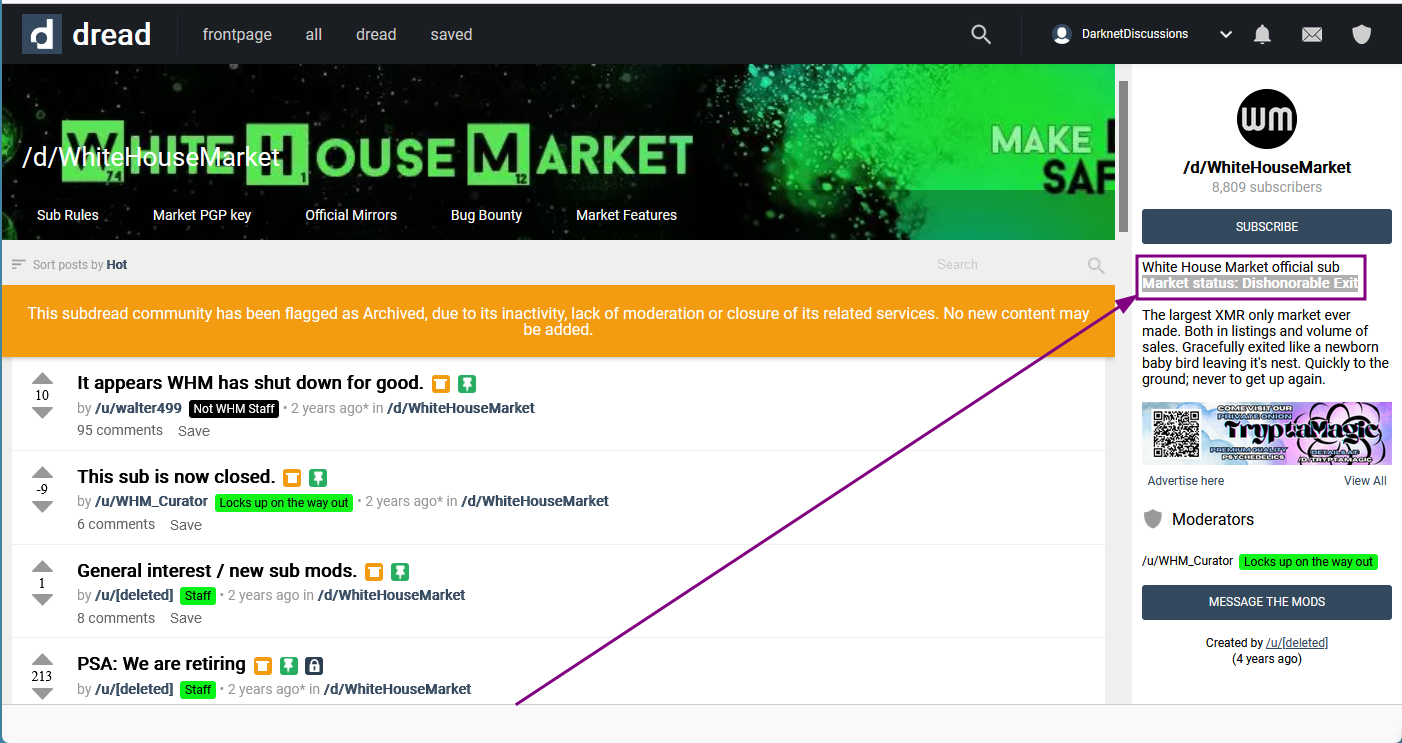

Here’s the cold, hard truth: the wool is being pulled over your eyes. Time and time again, markets that meet all the necessary criteria for Superlist entry are kept out, while scam markets that exited and returned are streamlined back in. Take M00nkey (now operating as Fish Market) and WHM (formerly Drughub) as examples. Both markets scammed users in the past, disappeared, and then returned under new names, only to be quickly listed again on the Superlist.
It’s not a coincidence. Dread profits from these markets whether they exit scam or not. Why would they cut ties with a market when that same market is paying for advertising, buying banners, stickers, and making donations? They have a working relationship from the past, so even if the market scams users again, they’re kept around as long as the money flows.

This is why you’re seeing centralization on Dread with Recon, Daunt, and the Superlist all under its control. Look through the forum, and you'll see the mods promoting only Dread-affiliated services—"Use Daunt," "Trust the Superlist." Any other project or service gets labeled as a scam or removed immediately. It’s all about keeping a grip on the money-making operation and gatekeeping which markets can profit and which cannot.
Another example of this is how Dread handles problems with top donors. If a big donor gets into trouble, not only does Dread amplify the situation, but they make money off it by selling stickers. These top donors pay Dread $20,000 in stickers, which, when given out, push any post to the top and keep it there. It’s essentially paid vote manipulation. The whole system stinks, and you can clearly see how a handful of people are profiting off users while keeping innovation and good market admins down.
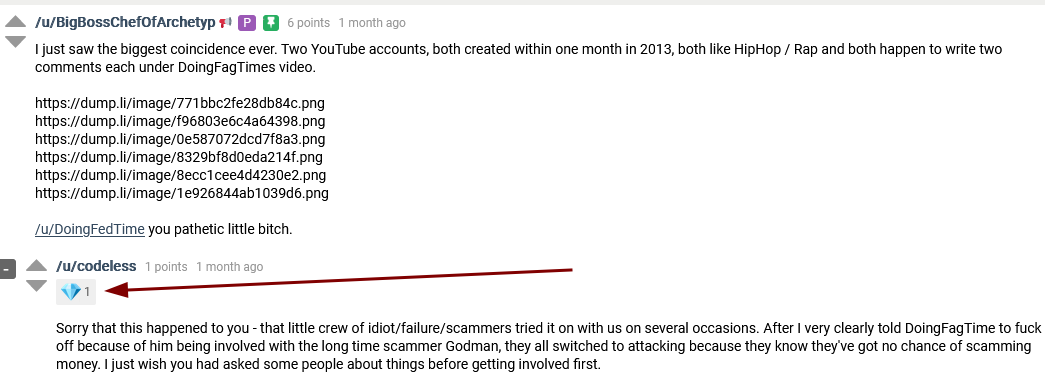

In short, Dread is no longer the community-driven platform it once was. It’s become a centralized, profit-driven operation where users are the product, and the only goal is to make money.
The Pneumonia & Selfharmhotline Scam
Now, let's dive into the Pneumonia & Selfharmhotline scam, one of the most disgraceful scams to ever hit Dread. This involves a user named /u/Pneumonia, who is a well-known serial scammer, yet somehow, Dread’s higher leadership allowed him to run a subdread that preyed on the suicide prevention community. Yes, you read that right—scamming from people struggling with mental health issues. It doesn’t get lower than that.
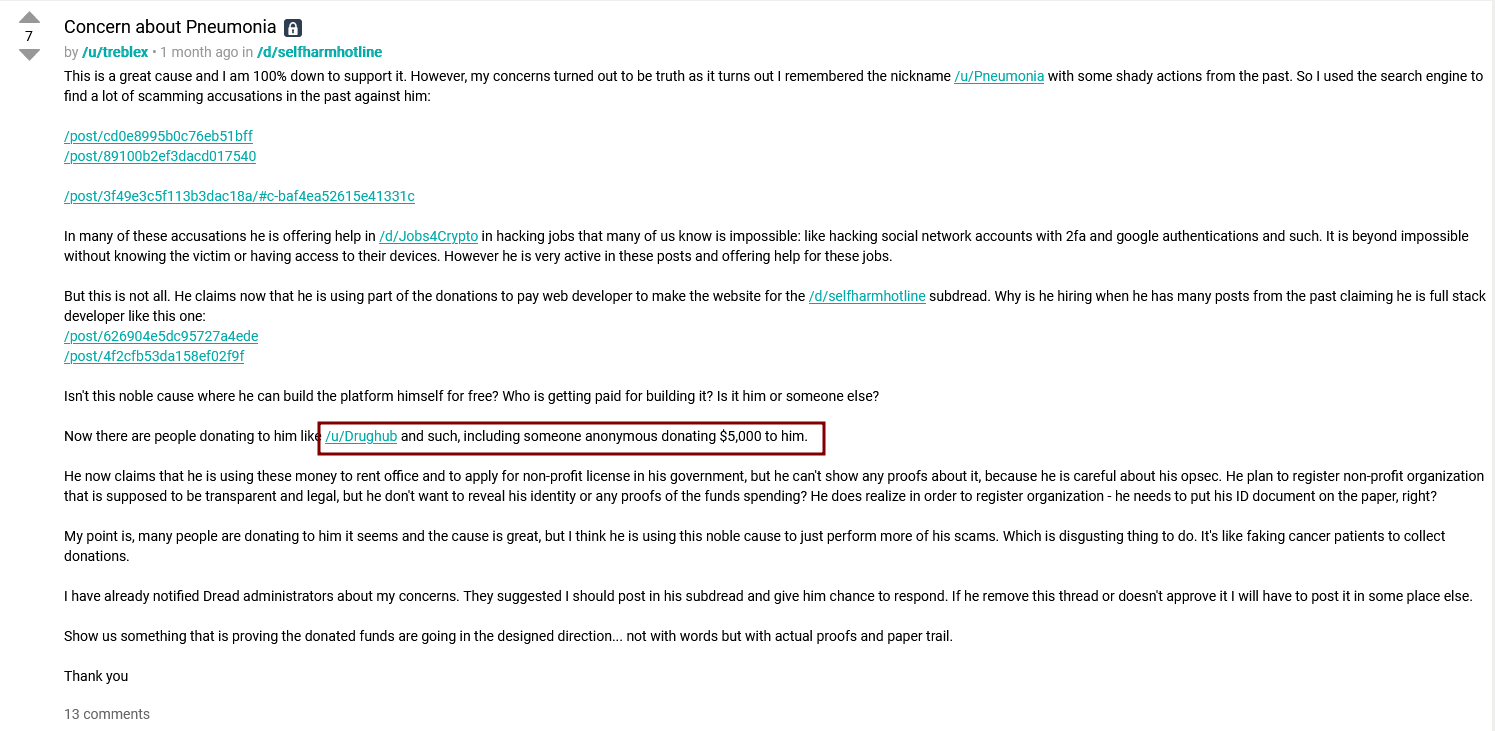
Pneumonia ran the sub /d/selfharmhotline, which was supposed to be a suicide prevention community. It collected donations to support the cause, but instead of helping, those funds ended up in his own pocket. He claimed the donations were being used to build a website, register a legal non-profit, and rent office space for the organization. But, surprise surprise, none of that ever materialized. When people began asking questions—like how the donations were being spent—he either blocked them or banned them from the sub. No answers, no proof, nothing. Just silence and censorship.
What makes this scam even more outrageous is that Pneumonia was Dread’s #1 donor for weeks. He wasn’t just pocketing the donations meant for a good cause; he was also bragging about how much he was donating to Dread, asking others to match his "generosity." All the while, his suicide prevention sub was nothing more than a front for him to line his pockets. And when the community finally caught on and the outrage kicked off, the account was banned, and all mentions of his high donations were conveniently erased. The whole thing was quietly swept under the rug.
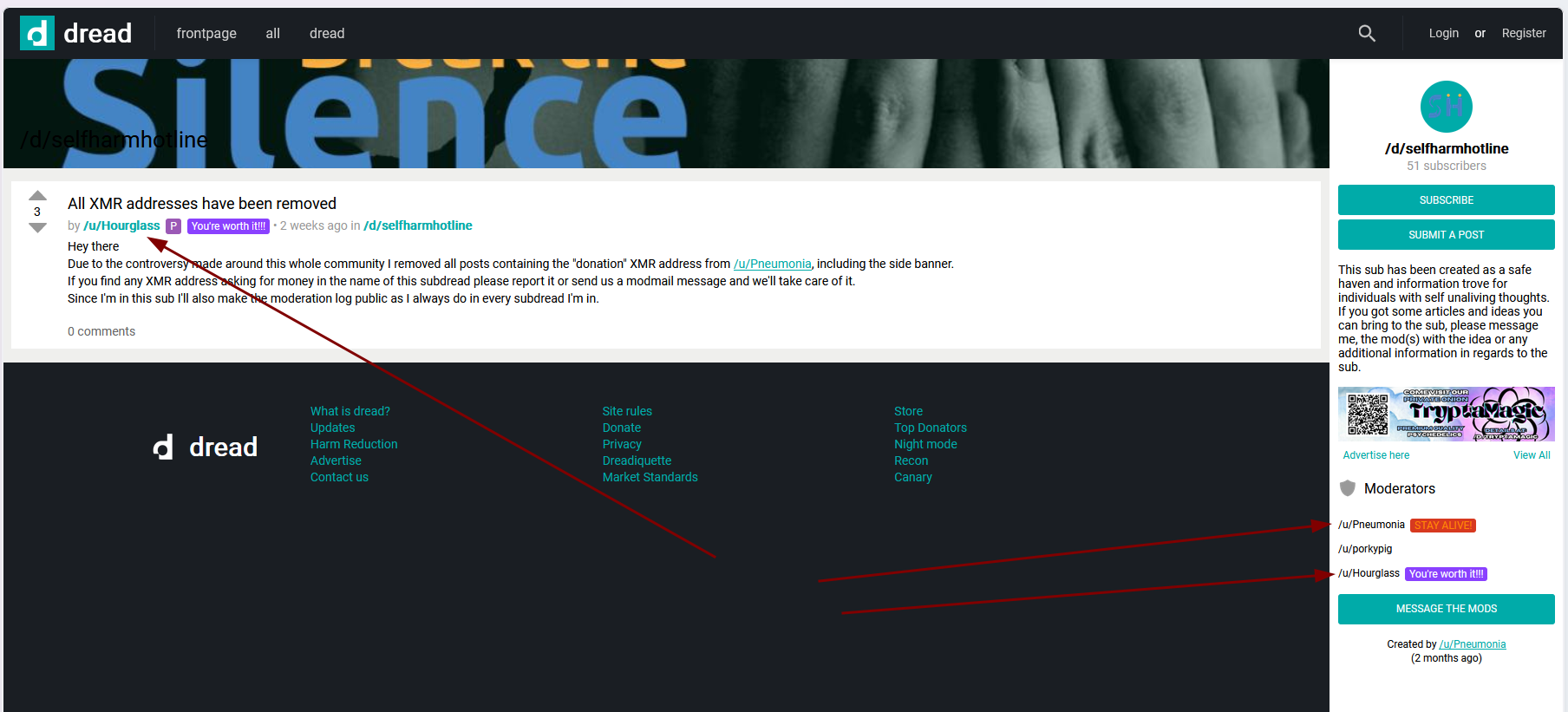
To this day, there’s no sign that Dread has made any attempt to make users whole after this scam. They took the donations, allowed a known scammer to operate freely, and then wiped the slate clean when it blew up in their faces. The community was left high and dry, and Pneumonia got away with thousands of dollars that should have gone to a cause as serious as suicide prevention.
This whole situation is a glaring example of how Dread’s leadership is willing to look the other way as long as money is flowing into their coffers. They let a serial scammer manipulate and exploit some of the most vulnerable people in the community, all because he was a top donor. The moment things got ugly, they erased all evidence of his donations and moved on, leaving users to deal with the fallout.
The Pneumonia scam isn’t just a one-off. It’s part of a larger pattern of behavior on Dread, where scam artists and fraudsters are protected if they can pay their way to the top. And when the truth comes out, Dread’s leadership just sweeps it under the rug, hoping people will forget. It’s a sickening cycle, and the Pneumonia scam is one of the most disgusting examples of it.
The Demonic Malware Scam
Now let’s talk about Demonic, another scammer with deep ties to Dread’s upper leadership. This guy pulled off a classic con, scamming people out of over $300 for a program that didn’t even work. What’s worse is that he’s closely linked with the Archetyp admin, who’s spent a ton of money keeping certain voices quiet—mine included.
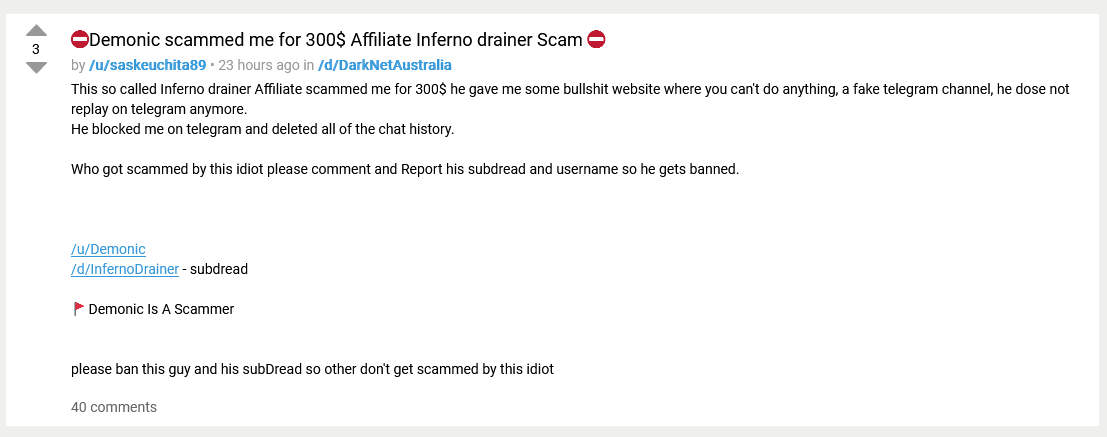
Dread is profiting off this relationship, promoting posts and running PR for these markets, while real users get scammed left and right. They’re all in it together—scammers, admins, and mods—siphoning money from users any chance they get. The Demonic malware scam is just the latest example of how far Dread has fallen. These people are lining their pockets while the community gets played.
Conclusion
In conclusion, Dread has shifted from being a respected hub for darknet market discussions to a breeding ground for scams, corruption, and deceit. The platform that once empowered users through decentralized market control and transparency has now become centralized, with a few individuals profiting from shady deals and relationships with scam markets. The Superlist, which was originally meant to protect users from exit scams, has instead become a tool for promoting markets that are only included because they’re lining Dread's pockets through gatekeeping.
The Pneumonia scam is just the tip of the iceberg—showing how Dread’s leadership is willing to look the other way as long as the money keeps flowing. Known scammers like Pneumonia are given free rein to exploit vulnerable users, while Dread profits from donations and advertising. And when things go south, they erase the evidence, leaving the community to clean up the mess.
The Demonic malware scam further highlights how intertwined these scammers are with Dread's higher-ups. The leadership is actively suppressing any voices that challenge their profit-driven motives while promoting scams through promoted posts and PR.
The cold reality is that Dread has lost its way. It is no longer about fostering innovation or providing a safe space for darknet users—it's about money. Users are no longer the focus, but rather the product to be exploited. As law enforcement continues to tighten its grip, markets are becoming more unstable, and the future looks grim. If we want to save the darknet market scene, we need to stop relying on centralized platforms like Dread and start building our own alternatives. Just as Bitcoin and Wikipedia showed us that decentralization is possible, the same can be true for darknet markets. It's time to stop feeding into Dread’s corrupt system and work toward creating a space where innovation, honesty, and fairness can thrive again.
#Darknet, #Cybercrime, #Privacy, #Tor Network, #crypto #Op-ed
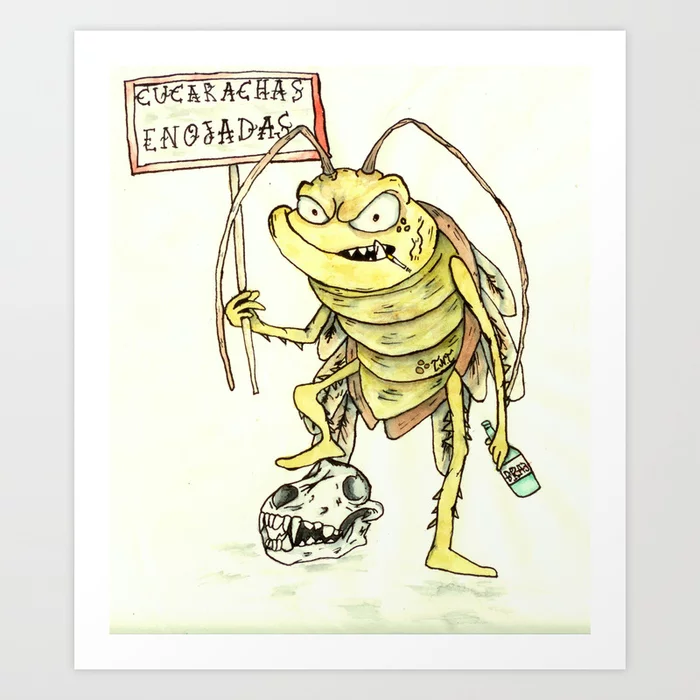
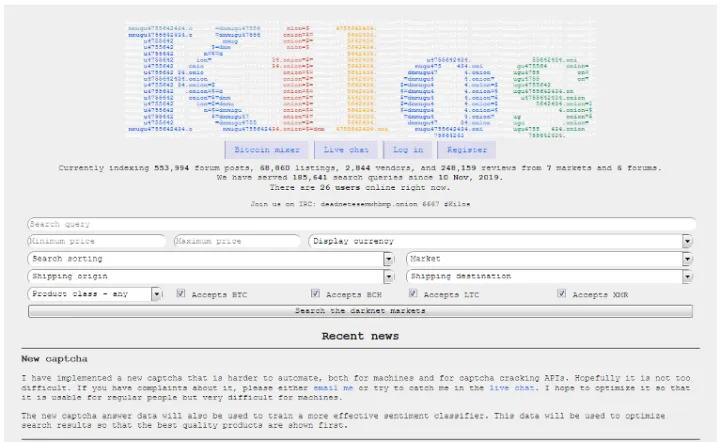

Comments ()